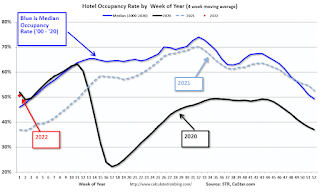U.S. hotel demand for the week between the Christmas and New Year’s Eve holidays was the highest ever recorded, and hoteliers capitalized, charging record-high weekly rates.
Christmas Day hotel occupancy also set a record in the U.S. at 47.3%; the previous peak was 47%, reached in 2015. New Year’s Eve hotel performance was likely limited by the rise in COVID-19 cases linked to the omicron variant, which resulted in limitations or outright cancellations of many large-scale celebrations. Occupancy on that day rose to 62%, which was higher than in 2019 (59.4%), but well below the peak set in 2016 (68.7%).
Occupancy for the seven-day period between Christmas Day and New Year’s Eve was 53.7%, which also was not a record and slightly below the level achieved in 2019.
emphasis added
The following graph shows the seasonal pattern for the hotel occupancy rate using the four week average.

The red dot is for 2022, black is 2020, blue is the median, and dashed light blue is for 2021.